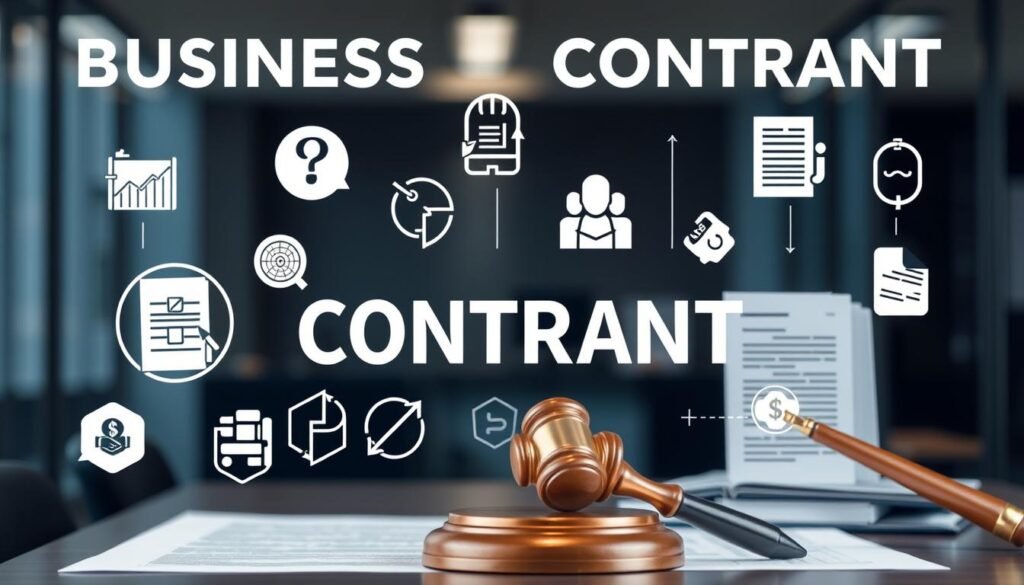As entrepreneurs, we’ve all felt the thrill and hurdles of the business contract requirements world. Whether it’s a big deal or a partnership, knowing how to meet business contract requirements and make legal agreements is key. Let me tell you a story that shows why this is so important.
Years ago, my colleague and I were excited to land a big contract with a big company. But when we looked closely, we found many unclear parts that could ruin the deal. It was a wake-up call, showing us how vital contract law knowledge is for any business leader.
In this guide, we’ll cover the must-knows for making strong business contracts. We’ll talk about the basic parts of a contract and how to handle ending agreements and solving disputes. You’ll learn how to make contracts that last and protect your business.
Key Takeaways
- Understand the core elements of a legally binding business contract
- Learn how to identify the key parties involved and their respective obligations
- Discover the importance of clear, unambiguous language in contract drafting
- Explore best practices for negotiating and reviewing contractual terms
- Gain insights into managing contracts effectively and mitigating potential risks
Understanding the Fundamentals of Business Contracts
In the world of business, business contracts are key to successful deals and partnerships. They outline the contractual obligations and duties of each party. This helps protect everyone’s interests. Knowing why business contracts matter is crucial for any entrepreneur or business expert.
What Are Business Contracts?
A business contract is a legally binding deal between two or more parties. It sets out the terms and conditions for a business transaction or partnership. These legal agreements clearly state each party’s rights, duties, and responsibilities. This ensures everyone knows what to expect and what’s expected of them.
Why Are Business Contracts Important?
The role of business contracts is vital. They create a clear, enforceable structure for business relationships. This reduces the risk of misunderstandings, disputes, and legal problems. Business contracts make sure everyone keeps their promises, protecting everyone’s interests.
- Establish clear expectations and obligations for all parties
- Protect the interests of all parties involved in the transaction
- Provide a legal framework for resolving disputes and enforcing the agreement
- Enhance the reliability and trustworthiness of business relationships
- Demonstrate the seriousness and professionalism of the business transaction
By grasping the basics of business contracts, entrepreneurs and business pros can confidently handle complex agreements. This ensures the success and growth of their businesses.
“A well-drafted contract is the foundation of a successful business relationship.”
Identifying the Parties Involved
When we make a business contract, it’s key to know who’s involved. We need to name the contracting parties, the legal entities, and the signatories. This makes sure the agreement is solid and can be enforced.
By clearly naming the people or groups that will be bound by the contract, we make sure everyone knows their role. This helps avoid confusion and makes sure everyone knows their duties and rights.
Specifying the contracting parties means giving the full legal names of those in the deal. This could be companies, partnerships, or other legal setups. It’s vital to check these names and their legal status to prevent future problems.
The contract should also list the signatories – the people who will sign for their groups. It’s important that these signers have the right to make this agreement. This makes the contract valid and enforceable.
By carefully naming the legal entities, contracting parties, and signatories, we build a strong contract. This focus on detail helps avoid confusion and sets up a clear partnership. It’s a key step for a successful business deal.
Offer and Acceptance: The Foundations of a Contract
At the heart of any business contract is the concept of offer and acceptance. These two elements are key to forming a contract. They show that both parties agree on the terms. Let’s explore what makes a valid offer and how acceptance works.
What Constitutes a Valid Offer?
A valid offer is clear and direct. It shows one party’s willingness to make a deal with specific terms. For an offer to be legally binding, it must have a few key traits:
- It must have definite and specific terms, like what’s being sold, the price, and when it’s delivered.
- It must show the offeror’s intent to create a legal agreement.
- The offer must be communicated to the other party clearly.
Acceptance: Establishing Mutual Assent
Acceptance is the last step in making a contract. It’s when the person receiving the offer agrees to the terms. For acceptance to be valid, it must:
- Match the terms of the original offer exactly, without changes.
- Be clearly communicated to the offeror, usually through a verbal or written response.
- Be done within the time frame given in the offer, or a reasonable time if none is given.
When the offeree’s acceptance is received, a contract is formed. Both parties must then fulfill their obligations. This mutual agreement is the foundation of a contract, ensuring both sides understand the deal.
| Key Elements of a Valid Offer | Requirements for Acceptance |
|---|---|
|
|
“The formation of a contract requires a meeting of the minds, which is established through the offer and acceptance of its terms.”
Knowing about offer and acceptance is key to making a business contract. By making sure these elements are right, you can build strong contracts. This helps avoid disputes and legal issues later on.
Consideration: The Exchange of Value
In the world of business contracts, consideration is key. It makes sure both sides get something valuable. This is what makes a contract legally strong.
Consideration can be money, goods, services, or even a promise not to do something. The important thing is that both sides get something valuable. Without it, a contract is just a promise and not legally binding.
The idea of consideration is all about the exchange of value in a contract. Both sides must give something valuable to make a contract valid. This is what makes a contract different from just a promise.
To make a contract valid, it’s important to check the consideration part. This ensures a clear and strong agreement. It protects everyone’s interests.

“Consideration is the price the promisor demands and the promisee pays for the promise.”
- Consideration can be in the form of money, goods, services, or the promise to refrain from doing something.
- Both parties must receive something of value in the exchange for the contract to be legally binding.
- Adequate consideration is a crucial element in creating an enforceable contractual obligation.
Understanding consideration in business contracts helps make agreements strong. It ensures everyone’s interests are protected.
Contractual Capacity and Legality
Contracts are legal agreements that need certain conditions to be valid. We will look at what makes a contract valid and why its purpose must be legal.
Contractual Capacity: Who Can Enter into a Contract?
To form a valid contract, parties must have the legal right to do so. This means they must be at least 18 years old and mentally able to understand the contract. Minors, those with mental issues, or under drugs or alcohol can’t legally agree to a contract.
Legality: Ensuring Lawful Purpose
A contract must also have a legal purpose to be valid. Contracts for illegal or unethical activities are not enforceable. It’s important for both sides to make sure the contract’s purpose is legal to keep it valid.
| Requirement | Description |
|---|---|
| Contractual Capacity | Parties must have the legal competence to enter into a binding agreement, typically meaning they are of legal age and have the mental capacity to understand the contract’s terms. |
| Lawful Purpose | The contract’s purpose must be legal and align with all applicable laws and regulations to ensure its validity and enforceability. |
Following the rules of contractual capacity and legal purpose is key for enforceable contracts. Knowing these basics helps businesses protect themselves and avoid legal issues later.
Essential Clauses in Business Contracts
When making a business contract, it’s important to include key clauses. These clauses outline what each party must do and what they can expect. They cover payment, pricing, and how work will be done.
Payment Terms and Pricing
Payment terms are a must in any contract. They explain when, how, and how much to pay for services or goods. You need to talk about payment schedules, deposits, accepted payment methods, and what happens if payments are late.
Also, the pricing should be clear. This includes any discounts, fees, or extra charges.
Delivery and Performance Obligations
The delivery and performance clause is about who does what and when. It should list deadlines, milestones, and what happens if these aren’t met. It’s also good to include rules for unexpected events that might delay work.
| Contractual Clause | Key Considerations |
|---|---|
| Payment Terms and Pricing |
|
| Delivery and Performance Obligations |
|
By focusing on these key clauses, businesses can make sure their contracts are clear and protect their interests.

Representations, Warranties, and Indemnification
When you write a business contract, understanding representations, warranties, and indemnification is key. These parts help share risk and make sure everyone is responsible.
Representations are facts one party shares with the other. They help the other decide to sign the deal.
Warranties are promises about the truth of certain facts. If these promises are broken, the other party might sue for damages or end the contract.
Indemnification clauses help one party get back losses from the other. They say when and why this can happen, like if a warranty is broken.
- Representations lay the groundwork for the deal.
- Warranties promise the truth of specific statements.
- Indemnification clauses share the risk of loss or damage.
By writing good representations, warranties, and indemnification clauses, businesses can manage risks well. These parts make sure everyone is responsible, protect against big losses, and set clear rules for everyone.
| Representations | Warranties | Indemnification |
|---|---|---|
| Statements of fact | Promises that certain facts or conditions are true | Contractual remedy for one party to recover losses or damages from the other |
| Basis for the other party’s decision to enter the agreement | Breach may give rise to legal recourse | Outlines the specific circumstances for indemnification |
| Establish the factual foundation of the agreement | Guarantee the truthfulness of specific statements | Helps to manage the risk allocation in the contract |
“Representations, warranties, and indemnification clauses are essential tools for managing risk and ensuring accountability in business contracts.”
Termination and Renewal Provisions
Understanding business contracts means knowing about termination and renewal. These parts show when an agreement can end and how to renew it. We’ll look at key points to consider when making a contract.
Termination Clauses
A good contract has clear rules for ending it. This includes contract termination for breaking the rules, not doing what’s agreed, or other reasons. The ending clause should say how to do it and any notice needed.
Renewal Options
Renewing a contract is key for a lasting business relationship. Renewal clauses explain how to keep the agreement going. This includes how long, any price or term changes, and when to say you want to renew. Good renewal clauses help keep partnerships strong and avoid contract expiration problems.
| Termination Provisions | Renewal Provisions |
|---|---|
|
|
By covering termination and renewal well, businesses can keep their contracts strong. This protects their interests and avoids problems or fights.

“Careful consideration of termination and renewal clauses can mean the difference between a successful long-term partnership and a premature contract dissolution.”
Dispute Resolution and Governing Law
Business contracts need clear rules for solving disputes and defining the law and place of jurisdiction. This helps keep contracts running smoothly and avoids legal problems.
Alternative Dispute Resolution Methods
Many businesses choose not to go to court. Instead, they use methods like arbitration and mediation. These are quicker, cheaper, and keep things private. Arbitration has a third-party make a final decision. Mediation helps both sides agree on a solution.
Choice of Law and Jurisdiction
Picking the right law and place for legal actions is key. The law chosen will decide how the contract is interpreted and enforced. The place chosen is where any legal issues will be handled. Thinking about these carefully helps ensure disputes are solved fairly and predictably.
| Dispute Resolution Method | Key Characteristics |
|---|---|
| Arbitration |
|
| Mediation |
|
By thinking about dispute resolution, governing law, and jurisdiction, businesses can set up a strong plan for handling contract disputes. This makes sure disputes are solved fairly and predictably.
Business Contract Requirements and Best Practices
Making strong business contracts is key to keeping your company safe. It’s important to use clear language and go through a detailed review and negotiation. This makes sure your contracts are solid and protect your interests.
Clear and Unambiguous Language
A good contract starts with clear language. If it’s not clear, it can cause problems later. Use simple words and avoid complicated terms. This way, everyone can understand the contract easily.
Review and Negotiation Process
Before you sign, review the contract carefully and negotiate. This helps spot any problems and makes sure you’re covered. Look at payment terms, what you have to do, and how to solve disputes. Negotiating these points can make the contract better for you.
Focus on clear language and a detailed review and negotiation. This way, your contracts will protect your company and help your partnerships succeed.
| Best Practices for Business Contracts | Importance |
|---|---|
| Clear and Unambiguous Language | Minimizes misunderstandings and disputes |
| Thorough Review and Negotiation | Ensures all terms and conditions are favorable |
| Adherence to Legal Requirements | Maintains the contract’s enforceability |
| Detailed Record-Keeping | Facilitates contract management and dispute resolution |

“A well-crafted contract is the foundation of a successful business relationship. Take the time to get it right from the start.”
By using these best practices, you can make contracts that protect your company. They help your partnerships work well and grow your business.
Amending and Modifying Contracts
In the fast-paced world of business, things can change quickly. This means contracts might need updates. Making changes to contracts is key to keeping up with new situations and keeping deals strong. This includes tweaking payment plans, pushing back deadlines, or changing what work needs to be done.
When you think about making changes to a contract, it’s important to do it right. Start by looking over the current contract to see how to make changes. You’ll find rules on how to change things, who needs to agree, and what kinds of changes are allowed.
- Make sure you know why you want to make changes. This helps make sure they’re fair and still match the contract’s original goals.
- Talk openly with the other side. Working together is crucial for making changes smoothly.
- Keep a detailed record of all changes. This makes sure the new contract is clear and both sides agree on the changes.
- Get the right people to sign off on the changes. This makes the contract updates official.
Being proactive and working together on contract changes can help businesses stay flexible and strong. Knowing how to handle changes well can keep contracts up-to-date and in line with your goals.
“Successful contract management requires a delicate balance between flexibility and stability. Amending and modifying contracts with care and diligence can help businesses navigate the ever-changing landscape and strengthen their competitive edge.”
Contract Management and Record-Keeping
Effective contract management and record-keeping are key for successful business agreements. Keeping detailed records and following best practices helps avoid risks. It also ensures compliance and improves contract processes.
Proper contract management means handling the whole contract lifecycle. This includes keeping all documents, communications, and changes on record.
Centralized Contract Repository
Businesses should have a central place for all contract documents. This spot should be easy to get to and safe. It lets the right people find and use important info when needed.
- Keep a detailed database of all contracts, old and new
- Sort contracts by type, department, or other useful categories
- Use version control to keep track of changes and updates
Systematic Record-Keeping Practices
Along with a central spot, businesses need to keep records systematically. This means documenting everything from start to finish. This includes:
- Notes from contract talks
- Final agreements and any changes
- Letters and emails with other parties
- Checks on how well things are going
- Any issues or claims that come up
Keeping detailed documentation helps with following rules, solving disputes, and learning for the future. It’s crucial for making smart decisions and growing the business.

“Effective contract management is the cornerstone of successful business partnerships and long-term growth.”
The Role of Legal Professionals
Legal professionals play a key role in creating and checking business contracts. Lawyers and others know a lot about contract law. They make sure the contract is legal, protects everyone involved, and follows the rules.
Even if businesses try to write their own contracts, getting help from lawyers is crucial. They help with writing, negotiating, and checking contracts. This ensures the language is clear and the terms are fair.
Legal experts also offer insights into what’s needed in different industries. They know about the latest trends in contract management. Working with them helps businesses make stronger contracts that help them achieve their goals.
| Role of Legal Professionals | Benefits for Businesses |
|---|---|
| Contract Drafting | Ensure legal compliance and protect business interests |
| Contract Review | Identify and address potential risks or ambiguities |
| Contract Negotiation | Advocate for favorable terms and conditions |
| Regulatory Compliance | Align contracts with industry-specific laws and regulations |
By working with legal professionals, businesses can make their contracts better and more reliable. This helps them grow and succeed in the long run.
“Effective contract management is essential for businesses to mitigate risks, protect their interests, and drive strategic success.”
Common Pitfalls and Mistakes to Avoid
Drafting and managing business contracts can be tricky. Even careful companies can run into contract pitfalls and mistakes. It’s important to watch out for these to make sure your contract enforcement works well.
One big mistake is using unclear language in contracts. Terms that are too vague or contradictory can cause problems. It’s best to be clear and straightforward in your contract.
- Avoid using complex or technical terms that might confuse people.
- Make sure all important terms and duties are clearly stated.
- Check the contract for any mistakes or contradictions.
Another mistake is not planning for unexpected situations. Contracts should cover possible changes, like market shifts or new laws. If you don’t plan for these, your contract might not hold up.
- Include clauses for unexpected events, like natural disasters.
- Set out how to change or update the contract if needed.
- Think about adding clauses for ending or renewing the contract.
Finally, don’t forget about managing your contract after it’s signed. Not keeping up with changes or records can weaken your contract. This can lead to legal issues later on.
| Common Contract Pitfalls | Potential Consequences |
|---|---|
| Ambiguous or unclear language | Disputes, difficulties in interpretation |
| Failure to address contingencies | Vulnerability to changing circumstances, difficult enforcement |
| Neglect of contract management and record-keeping | Undermined enforceability, increased risk of disputes |
By knowing about these contract pitfalls and mistakes, businesses can make better contracts. These contracts will help manage relationships and transactions effectively.
“The devil is in the details when it comes to business contracts. Attention to precision and foresight can make all the difference in avoiding costly disputes and ensuring the long-term success of your agreements.”
Filing for Divorce: Expert Legal Guidance
Conclusion
We’ve looked into what businesses need for contracts to be legally strong. We learned about the basics of contract law. This includes the need for an offer, acceptance, something of value, and the ability to make a contract.
We also talked about important parts of a contract. These are payment details, when things need to be done, promises, and how to end the contract. Knowing how to solve disputes and which laws apply is also key.
So, what should businesses remember? They should use clear language, check and talk over the contract well, and get legal help when needed. Following these steps helps avoid problems and makes contracts work better for everyone.
